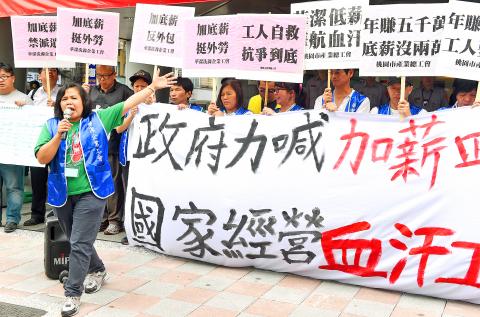Members of the China Pacific Laundry Services Workers’ Union burst into applause late on Sunday night after they voted to go on strike by 58 to 17, following failed negotiations with the company to improve their wages and working conditions.
After the vote, the union announced that the strike was to take effect immediately and cordoned off the company premises to prevent access to laundry products.
Owned jointly by China Airlines Ltd (中華航空) — Taiwan’s largest carrier — and Swire Pacific (太古), the facilities are used to clean uniforms for flight attendants, as well as the blankets, seat covers and dining towels used on China Airlines flights.

Photo: Chien Jung-fong, Taipei Times
The union sought a NT$10,000 (US$323.29) raise in monthly wages, an end to the use of short-term contractors without permission from the union and changes to charges for food and lodging taken from migrant workers.
Despite more than a decade in service, many senior employees at the firm receive a monthly wage of about NT$18,600, which is below minimum wage, the union said.
Wages at the company increased by less than NT$2,000 over the past 10 years, it added.
As of press time last night, the union’s occupation of the firm’s facilities continued, with lines of workers standing guard over the company grounds.
Tensions had escalated over the past month, with the union demanding raises after the company outsourced work to other laundry contractors, which led to a significant decrease in overtime pay.
Union secretary-general Lin Chuang-chou (林莊周) said that the company had no reason to keep wages so low because the firm recorded profits of more than NT$50 million last year.
He added that the company should stop taking advantage of its workforce, which includes many employees from disadvantaged groups, such as foreign spouses from Southeast Asia, Aborigines and elderly women.
“Over the past 10 years, the company almost never improved its working conditions. I think the point is that workers must fight for their own benefits,” union volunteer Chen Liang-fu (陳亮甫) said.
He added that direct action by employees could be more effective than recent legislative drives for the “four laws for pay raises” to legally require companies to share their profits.
China Airlines said its flights would not be affected by the strike, adding that the company would continue to seek dialogue with the strikers.

Right-wing political scientist Laura Fernandez on Sunday won Costa Rica’s presidential election by a landslide, after promising to crack down on rising violence linked to the cocaine trade. Fernandez’s nearest rival, economist Alvaro Ramos, conceded defeat as results showed the ruling party far exceeding the threshold of 40 percent needed to avoid a runoff. With 94 percent of polling stations counted, the political heir of outgoing Costa Rican President Rodrigo Chaves had captured 48.3 percent of the vote compared with Ramos’ 33.4 percent, the Supreme Electoral Tribunal said. As soon as the first results were announced, members of Fernandez’s Sovereign People’s Party

MORE RESPONSIBILITY: Draftees would be expected to fight alongside professional soldiers, likely requiring the transformation of some training brigades into combat units The armed forces are to start incorporating new conscripts into combined arms brigades this year to enhance combat readiness, the Executive Yuan’s latest policy report said. The new policy would affect Taiwanese men entering the military for their compulsory service, which was extended to one year under reforms by then-president Tsai Ing-wen (蔡英文) in 2022. The conscripts would be trained to operate machine guns, uncrewed aerial vehicles, anti-tank guided missile launchers and Stinger air defense systems, the report said, adding that the basic training would be lengthened to eight weeks. After basic training, conscripts would be sorted into infantry battalions that would take

GROWING AMBITIONS: The scale and tempo of the operations show that the Strait has become the core theater for China to expand its security interests, the report said Chinese military aircraft incursions around Taiwan have surged nearly 15-fold over the past five years, according to a report released yesterday by the Democratic Progressive Party’s (DPP) Department of China Affairs. Sorties in the Taiwan Strait were previously irregular, totaling 380 in 2020, but have since evolved into routine operations, the report showed. “This demonstrates that the Taiwan Strait has become both the starting point and testing ground for Beijing’s expansionist ambitions,” it said. Driven by military expansionism, China is systematically pursuing actions aimed at altering the regional “status quo,” the department said, adding that Taiwan represents the most critical link in China’s

‘REALLY PROUD’: Nvidia would not be possible without Taiwan, Huang said, adding that TSMC would be increasing its capacity by 100 percent Nvidia Corp CEO Jensen Huang (黃仁勳) on Saturday praised and lightly cajoled his major Taiwanese suppliers to produce more to help power strong demand for artificial intelligence (AI), capping a visit to the country of his birth, where he has been mobbed by adoring fans at every step. Speaking at an impromptu press conference in the rain outside a Taipei restaurant, where he had hosted suppliers for a “trillion-dollar dinner,” named after the market capitalization of those firms attending, Huang said this would be another good year for business. “TSMC needs to work very hard this year because I need a lot